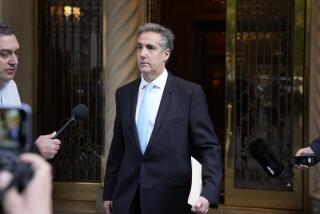Clinton Denies Gifts Linked to Arkansas Appointments
LITTLE ROCK, Ark. — President Clinton, testifying in a second Whitewater criminal trial, insisted in videotaped testimony played Thursday that there was no connection between financial contributions to his 1990 gubernatorial campaign and his appointment of the contributors to state commissions in Arkansas.
Appearing relaxed in the 95-minute videotape recorded 11 days ago at the White House, Clinton offered warm praise for the two Arkansas bankers who are being tried on charges that they misapplied bank funds to reimburse themselves for campaign gifts toward Clinton’s successful reelection as Arkansas governor six years ago.
In describing co-defendants Herby Branscum Jr. and Robert M. Hill as the best qualified appointees to a state highway commission and a banking commission, respectively, Clinton said that he was grateful for their financial backing “but I didn’t think people should be disqualified . . . just because they had supported the governor.”
Prosecutor W. Hickman Ewing Jr., who works for Whitewater independent counsel Kenneth W. Starr, has told jurors that Branscum and Hill won their 1990 appointments by misusing $13,200 in corporate funds from the Perry County Bank, which they jointly owned. They used the money to reimburse themselves for donations to Clinton and other candidates in their own names and the names of relatives and friends, Ewing has charged.
The two men also are accused of violating banking laws by failing to report to the Internal Revenue Service $52,500 in cash withdrawals by the Clinton campaign in 1990--cash that was used for last-minute get-out-the-vote activities, according to campaign officials.
Although Clinton was not asked about that charge, Bruce Lindsey--his longtime confidant and deputy White House counsel--vehemently denied in testimony this week that he had urged bank officials not to file the required federal reports. Lindsey had been Clinton’s campaign treasurer.
Clinton, wearing a dark suit and light blue polka-dot necktie, smiled often during his testimony and seemed to enjoy himself occasionally as he reminisced about his last election as governor before running for president two years later.
The tape, originally 2 1/2 hours long, had been edited to delete extraneous material and some questions that the judge ruled irrelevant.
In April, Clinton had given videotaped testimony--also for the defense--in the Whitewater fraud and conspiracy trial of James B. and Susan McDougal and then-Arkansas Gov. Jim Guy Tucker. The McDougals, who were business partners of the Clintons in their Whitewater land development venture in the 1980s, were convicted along with Tucker, who resigned from office earlier this week.
In that trial, as in the current one, the president has not been accused of wrongdoing. The financing of Clinton’s 1990 campaign, however, has been a central issue in the Branscum-Hill trial.
Clinton’s statements under oath were recorded July 7 in the White House Map Room. They were shown Thursday on four television monitors in the courtroom of U.S. District Judge Susan Webber Wright.
Seated in a straight-backed chair alongside a mahogany cabinet, the president described the defendants as longtime friends and financial supporters. His warmest praise was for Branscum.
“Did you appoint Herby Branscum because of any financial contribution made in 1990 by him or by Rob Hill?” asked defense attorney Dan Guthrie.
“No, I did not,” the president replied. “I appointed him because I thought he was the best person under consideration, and it was an important position. . . . Our relationship was very close.”
He said that Branscum has been a dedicated supporter “since he worked on my unsuccessful campaign for Congress in 1974.”
Branscum later served six years as chairman of the Arkansas Democratic Party, the president reminded jurors, who sat in rapt attention before the courtroom’s largest TV monitor.
Clinton said that after the 1990 election he decided to reappoint Hill to the banking commission “because he was interested in serving and had good support” from the banking community.
Asked by Hill’s attorney, Jack Lassiter, if he was aware of Hill’s financial support at the time, Clinton smiled and said: “I’m sure I was. And I was grateful for his support. But I didn’t think people should be disqualified” from being appointed because they contributed.
As to his general policy on appointments, Clinton told Ewing: “There were many times I appointed someone and did not appoint someone else who had given more money. That happened quite often.”
He said that he could not recall a meeting with Hill and Kent Dollar, another Perry County Bank official, on Dec. 14, 1990, during which Hill recommended Branscum for appointment to the powerful highway commission, which does not pay a salary.
According to campaign records put into evidence, that was the same day Lindsey recorded receiving thousands of dollars from Hill and his associates to help retire Clinton’s large post-election campaign debt.
“I don’t question that the meeting occurred, but I just don’t remember it,” the president said. Donning a pair of rimless reading glasses, he examined a memo about the 1990 meeting that bore his distinctive, left-handed check mark.
Jurors laughed when the president said: “I recognize my backward check mark, although it’s not backward to me.”
In response to questions from Ewing, Clinton said that he would not know if Branscum and Hill had misapplied bank funds to make their contributions. Clinton said that his campaign “had an operation that processed the checks” but usually did not look beyond the name and address of any donor.
More to Read
Get the L.A. Times Politics newsletter
Deeply reported insights into legislation, politics and policy from Sacramento, Washington and beyond. In your inbox three times per week.
You may occasionally receive promotional content from the Los Angeles Times.










